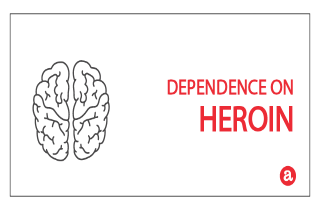Heroin can be injected intravenously, inhaled by snorting or sniffing, or smoked. All routes of administration transport the drug to the brain very quickly. So, people who use heroin regularly can develop dependence to it, which they experience withdrawal symptoms when heroin dosing is significantly reduced or ends abruptly. More on symptoms of becoming physically dependent or addicted to heroin here.
Heroin dependence vs. addiction
Dependency on heroin develops in users who maintain the habit daily. By taking heroin daily, you (in effect) trick the brain into speeding up to counter the depressant effects of heroin. But when the body can no longer function at its normal level without the drug, you experience withdrawal symptoms when it is no longer available. If a dependent person suddenly stops taking heroin, unpleasant withdrawal symptoms will follow. But when you withdraw from heroin, symptoms eventually subside. If cravings remain afterwards, this is a sign of addiction to heroin.
Heroin is powerfully addictive. But addiction is different than dependence. Addiction is characterized by the psychological craving and urge to use heroin despite negative consequences to one’s life. Regardless of the method of abuse, heroin addiction often occurs as a result of frequent use. The longer a person uses heroin, the stronger the addiction becomes.
Heroin dependence time: How long to be dependent on heroin?
A person can become psychologically hooked on heroin even after trying it once, and that one time can easily lead to another use in the future. But generally, heroin dependence occurs within a few times of repeated dosing. Heroin causes rapid tolerance when used frequently, so doses increase dramatically from first dose onwards. Inhaling doses of heroin usually start at about 5 and 20 mg of pure heroin, while intravenous doses start from 5 to 10 mg.
Dependence on heroin symptoms
Heroin dependence is a medical condition characterized by symptoms that occur when you stop using heroin. If the following symptoms manifest when heroin is no longer available, these are a clear indicator that a person has become dependent on heroin:
- a racing heartbeat
- anxiety
- dilated pupils
- goose bumps
- high blood pressure
- paranoid delirium
- severe gastrointestinal distress
- sleeplessness
- strong drug cravings
violent behavior
Heroin dependence withdrawal
Heroin withdrawal begins within 6 to 12 hours after the last administered dose, with the appearance of symptoms that mimic those of a severe flu, along with anxiety and yawning. This is followed by a few hours of restless sleep. After 36 to 72 hours, heroin withdrawal symptoms peak. But, most of these symptoms resolve after 5 to 10 days.
Physical dependence on heroin
Both physical and psychological dependence on heroin are very strong, and in most cases they develop rapidly. Physical dependence occurs when a persons’ body becomes accustomed to the drug and adapts to functioning with heroin present. When heroin is used over and over again, the initial intense pleasure decreases within the first few weeks. And with continued use, the dosage needs to be increased to achieve similar initial effect (a.k.a. tolerance) and you crave the drug more often.
Psychological dependence on heroin
Heroin is psychologically addictive because it produces desirable feelings and emotions in the user. Psychological dependence occurs when satisfying the need for heroin becomes the main motivating force in a person’s life. People experiencing psychological dependency to heroin feel the urge to use heroin most times and can result in social marginalization. The sedative effects of heroin make serious problems such as homelessness, unemployment, abuse and other, easy to cope with. But anyone can easily become hooked; heroin is not a drug to be underestimated.
Heroin dependence questions
If you feel you or a loved one need help overcoming heroin dependence or abuse problem, feel free to ask any questions or share experiences in the comments section below. We will answer all legitimate questions quickly and personally, and we can also refer you to other resources for more professional advice.









Related Posts